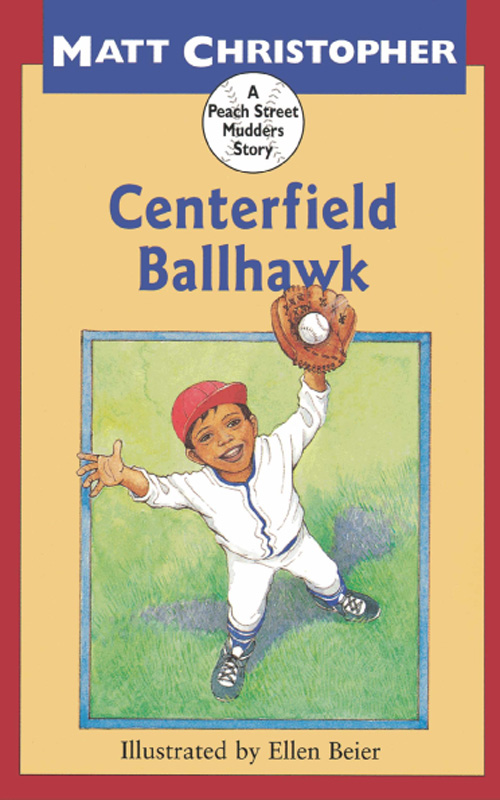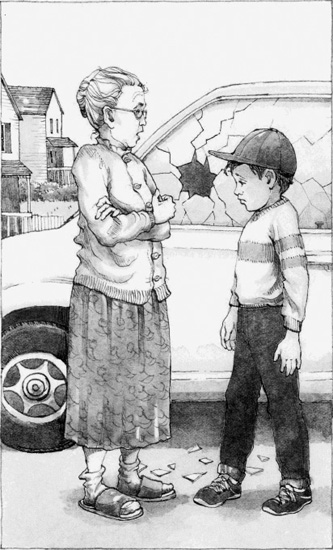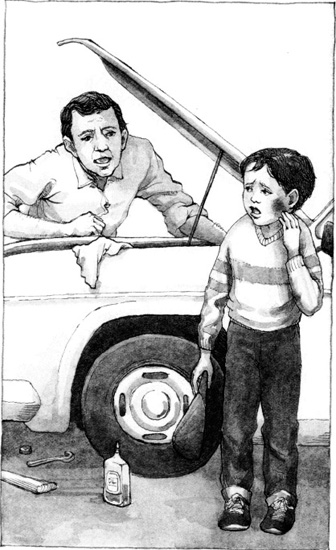Centerfield Ballhawk
Read Centerfield Ballhawk Online
Authors: Matt Christopher,Ellen Beier

Text copyright © 1992 by Matt Christopher Royalties, Inc.
Illustrations copyright © 1992 by Ellen Beier
All rights reserved.
Little, Brown and Company
Hachette Book Group
237 Park Avenue
New York, NY 10017
Visit our website at
www.HachetteBookGroup.com
First eBook Edition: December 2009
Matt Christopher® is a registered trademark of Matt Christopher Royalties, Inc.
The characters and events portrayed in this book are fictitious. Any similarity to real persons, living or dead, is coincidental
and not intended by the author.
ISBN: 978-0-316-09496-2
Contents
For Matthew Alexander Lurie

CRACK!
Crash
.
The first sound came when José Mendez’s bat hit the ball. The second came when the ball smashed through a car’s window.
José froze.
“Oh, no!” Sparrow Fisher moaned.
“Oh, yes,” José murmured, sick to the bone. The hole was baseball size, surrounded by thin zigzag cracks. It was in the left
front window of Mrs. Dooley’s new car. Mrs. Dooley was
José’s neighbor, and she hated baseball more than crabgrass.
“Go after it, Sparrow!” José cried. “Maybe the door’s unlocked!”
“Oh, yeah?
You
go after it,” Sparrow said. He was ten, a year older than José, with hair the color of ripened wheat.
José clamped his jaws tight, then dropped his bat and ran across the yard to Mrs. Dooley’s car. He had to jump over the hedge
to get to it, but that was no problem.
The problem was the car door. It was locked. So was the rear door.
“José Mendez! Just what do you think you’re doing?” a shrill voice cried out.
For the second time in twenty seconds, José froze. Mrs. Dooley, a small, skinny woman, was standing in her doorway, staring
at him through her narrow glasses.
“I — I was trying to get our ball, Mrs. Dooley,” José answered nervously.
She came trotting down the steps, her slippers slapping against her feet. “What happened here? Oh, no!” she cried. “You broke a window in my car, didn’t you? You’ll
pay for this, young man! You hear me? You’ll pay for this!”

She gave José a glare that would have curled a flower, then turned back to the hole in the car window. “I knew something like
this would happen,” she said angrily. “You should know better than to play baseball in your front yard. Hasn’t your father
—”
“Yes, Mrs. Dooley,” José interrupted. “My father has warned me not to. I’m sorry.”
He heard footsteps behind him, and turned. His father had come out onto the porch.
“Don’t worry, Mrs. Dooley,” he said, his voice calm. “José will pay for it. You can bet on that.”
Then his eyes bored into José’s, and for the first time in his life José wished he could make himself disappear.
* * *
“You are grounded from playing baseball for two weeks,” José’s father said to him in the house. “If the Peach Street Mudders
can’t get along without you for that long, too bad. I’ve warned you about playing pepper out there. All it takes is one hard
swing and — pow! — the ball is in Mrs. Dooley’s yard. This time it was worse — it hit her new car.”
“I’m sorry, Dad,” José said, lowering his head. “I — I didn’t mean . . .” He couldn’t say any more. He had no excuse. He should
have known better.
José loved playing baseball so much that he tended to forget about other things. Like his father’s warning.
Don’t you remember what it was like, Dad?
José wanted to say to him. Mr. Mendez had played in the minor league, and he had taught José everything he knew about the
sport. Baseball had always been their common bond. Lately, though, things had changed. Most of the time, it seemed to José,
his father was
angry with him. Today he had good reason to be. As for the other times, José could only conclude that he was a disappointment
to his father.
Sorry, Dad, he thought. I’ll make it up to you. I promise.

SMACK!
José’s bat met the ball squarely in its center and drove it hard against the net. He popped the next two pitches and missed
the next. He let the fourth pitch go by.
“What’re you doing, old buddy?” a familiar voice piped up behind him. “Practicing to be a better hitter than your friend Barry
‘Hit-Away Kid’ McGee?”
José turned and saw Barry standing behind the batting cage screen. Barry was the Peach Street Mudders’ left fielder.
“I’ll never be as good as you,” José said. “You’re the best, Barry.”
The red-headed kid with Barry grinned. Bus Mercer was the Peach Street Mudders’ shortstop. “Want me to pinch-hit for you,
José?” he said, kidding.
“Somebody
might have to,” José said.
He swung at the remaining pitches that shot out of the ball gun — hitting some, missing some — then stepped out of the batting
cage. He wiped his sweating forehead with his shirtsleeve.
“You guys want to see a real hitter?” Bus said. “Stick around.”
He paid for a round and hit every pitch but two.
Then Barry took his turn.
POW! POW! POW!
He hit every pitch solidly. José watched him with envy. If I could hit like that, I wouldn’t have to come to this batting
cage, he thought. I wouldn’t have to worry about being a disappointment to my father.
When the pitches stopped coming, Barry stepped out of the cage. He hadn’t even worked up a sweat, José noticed.
“What
are
you doing here?” Barry asked him. “Weren’t you grounded?”
“Yeah,” Bus joined in. “Sparrow told us how you creamed that old lady’s car.”
José’s face turned red with embarrassment. “I was grounded from playing on the team. My dad didn’t say anything about practicing.
And I figured I should stay in shape.” He didn’t want to tell them the real reason he was practicing. He didn’t think they’d
understand.
“Good idea,” said Barry. “I sure hope your dad changes his mind. We really need you.”
José blushed again, this time with pleasure. “Aw, I bet you won’t even notice I’m not there,” he said modestly.
“Sure we will,” said Bus. “You’re the best fielder we have.”
José enjoyed the compliment, but he wished
he was valued for being a good hitter. A good hitter like his father was — he’d batted .375 when he’d played in the minors.
If he could match his father’s average, José figured, he might get back into his father’s good graces.
With new determination, José bought another round. It was only a dollar for fourteen pitches. He stepped in the box, held
his bat ready, and triggered the gun. A ball shot out of the mouth of the pitching machine like a white meteor.
José swung.
Crack!
The ball bounced off the top of his bat and hit his cheek.
Oh, no! his mind screamed as he stepped out of the batter’s box and rubbed his fingers lightly over the bruise. He could feel
it beginning to swell.
Yikes! How was he going to explain this to his father? He had told him that he was going over to Barry’s house. A lot of good
this practice session had done him!

The three boys quit playing and headed for home. Barry and Bus talked about the Bay Street Stingers, the team they were playing
against tomorrow. José worried about the red spot on his cheek and what he’d say to his father.
When he reached his house, José saw that the garage door was open. His father was working on the car.
José walked on the grass on his way to the front porch, hoping it would muffle his footsteps.
“José?”
José stopped dead. His father had heard him.
Nervous, José turned and entered the garage. He covered the bruise with his hand, moving his fingers a little as if he were
scratching an itch.
Mr. Mendez was pouring oil into the engine’s crankcase. He looked at José. “You look sweaty,” he observed. “You and Barry
been playing ball?”
José shrugged. “Well, yeah. In a way.”
Mr. Mendez’s eyes narrowed. “In a way? What do you mean?”
“We were having batting practice.”
His father frowned. “Batting practice? Even though I told you you were grounded?”
“From everything? I wasn’t playing with the team . . .”
Mr. Mendez straightened up. He was staring at José’s cheek. Suddenly José realized that he had forgotten about the bruise
and had taken his hand off it.
